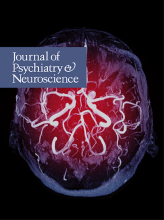Mentally ill patients show an elevated rate of aggressive behaviours, and patients with psychosis are 4 times more likely than the general population to commit violent acts, while patients suffering from schizophrenia will be responsible for approximately 10% of significant aggression, defined as “physical attacks on other persons, on property, or on one’s self (self-mutilation), with deliberate destructive intent” (Arseneault et al, Arch Gen Psychiatry 2000;57:979–86).
A 28-year-old man suffering from schizophrenia (paranoid subtype, DSM-IV) since his early 20s presented with mostly positive symptoms, such as delusions of persecution, auditory hallucinations and disorganized speech, which had been well controlled with haloperidol (30 mg/d) and thioridazine (200 mg/d). Procyclidine (15 mg/d) had been prescribed to control extrapyramidal symptoms.
One month before the man was admitted to hospital, he became progressively more agitated, angry, verbally aggressive at home and unable to control his rage outbreaks. When he threatened his mother with a knife and tried to kill her, his father called emergency services, and the man was admitted to the hospital.
At the emergency department, he received diazepam (2 mg intramuscularly every 4 hours). Two days later, after a routine electrocardiogram and electroencephalogram and blood tests, treatment with clozapine was initiated. The dosage was progressively increased to reach the maintenance dose of 600 mg/d within 6 weeks. Valproic acid (500 mg, 3 times daily) was begun at the same time as clozapine. Diazepam was stopped after 3 weeks. A significant decrease of severe aggressive symptoms (e.g., threatening gestures, loss of control) was observed within the first week of treatment, but it took 2 months before all aggressive symptoms (i.e., verbal insults and irritability) were controlled.
Aggression is a complex phenomenon influenced by genetic, neurobiological and psychosocial factors. Impairments of many neurotransmitter systems, including serotonin (5-HT), dopamine (DA) and norepinephrine (NE), are implicated in the biology of aggression. Dysfunction of several receptor subunits and other neuronal elements (e.g., 5-HT1B, GABAA and NMDA receptors, the 5-HT transporter, the enzymes monoamine oxidase-A and nitric oxide synthase and neuroactive steroids) have also been recently reported.
Clozapine is an atypical antipsychotic that reduces positive and negative symptoms, decreases substance abuse craving and suicidality and rarely causes extrapyramidal symptoms. In the last 10 years, various studies on its effects on hostility and aggression have demonstrated its unequivocal superiority over typical antipsychotic drugs. The reduction of aggressive behaviours by clozapine may be explained not only in terms of sedative or antipsychotic effects, but also by its ability to reduce impulsivity. Moreover, because of its unique pharmacological profile, including a high ratio of affinity for D1/D2 receptors and antagonistic effects at 5-HT (i.e., 5-HT2A, 5-HT2C, 5-HT7) and alpha-2 adrenergic receptors, clozapine could be a valid tool for treating aggression.
Antiepileptic drugs such as valproic acid, carbamazepine and gabapentin might also be useful in the control of aggression. Preliminary reports suggest that they are effective in treating violent behaviour associated with schizophrenia, dementia and organic psychosis, such as after brain injuries where an important frontal lobe involvement has been documented, but few double-blind studies have been conducted to confirm this clinical evidence. The pharmacological efficacy of valproate on aggression may be related to an increase of GABAergic transmission and an antagonism of NMDA and non-NMDA receptors (Janiri et al, Can J Physiol Pharmacol 1994;72(Suppl 1):13.3).
Given the important ethical and social issues involved, further double-blind pharmacological studies and more preclinical research are urgently needed in the pharmacology of aggression.
Footnotes
To submit questions for this regular feature, please send them to the Journal of Psychiatry & Neuroscience / Revue de psychiatrie & de neuroscience, Canadian Medical Association, 1867 Alta Vista Dr., Ottawa ON K1G 3Y6, Canada; fax 613 729-9545; jpn.office{at}sympatico.ca. Please include details of any relevant case and your name, address, telephone and fax numbers as well as your email address.
The information in this column is not intended as a definitive treatment strategy but as a suggested approach for clinicians treating patients with similar histories. Individual cases may vary and should be evaluated carefully before treatment is provided.
Competing interests: None declared.






